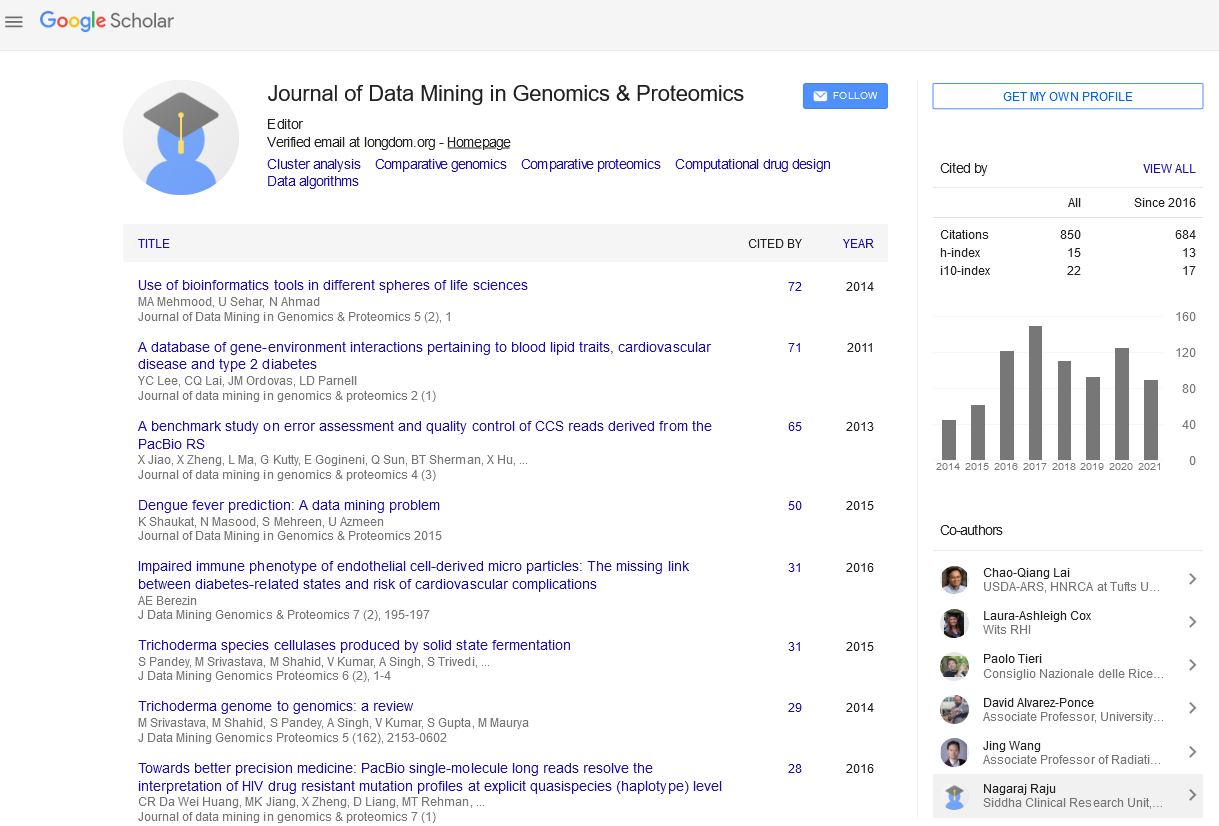PMC/PubMed Indexed Articles
Indexed In
- Academic Journals Database
- Open J Gate
- Genamics JournalSeek
- JournalTOCs
- ResearchBible
- Ulrich's Periodicals Directory
- Electronic Journals Library
- RefSeek
- Hamdard University
- EBSCO A-Z
- OCLC- WorldCat
- Scholarsteer
- SWB online catalog
- Virtual Library of Biology (vifabio)
- Publons
- MIAR
- Geneva Foundation for Medical Education and Research
- Euro Pub
- Google Scholar
Useful Links
Share This Page
Journal Flyer

Open Access Journals
- Agri and Aquaculture
- Biochemistry
- Bioinformatics & Systems Biology
- Business & Management
- Chemistry
- Clinical Sciences
- Engineering
- Food & Nutrition
- General Science
- Genetics & Molecular Biology
- Immunology & Microbiology
- Medical Sciences
- Neuroscience & Psychology
- Nursing & Health Care
- Pharmaceutical Sciences
Cancer pharmacogenomics: Discovery science and translational science
2nd International Conference on Big Data Analysis and Data Mining
November 30-December 01, 2015 San Antonio, USA
Liewei Wang
Mayo Clinic Rochester, USA
Posters-Accepted Abstracts: J Data Mining Genomics Proteomics
Abstract:
We have developed an in vitro model system that consists of 300 human lymphoblastoid cell lines (LCLs) with extensive highthrough genomic data including genome wide SNPs, basal expression array, CpG methylation and microRNA data, together with drug cytotoxicity data to help identify candidate genes that might contribute to chemoresistance and response to targeted therapy and at the same time, to help understand the mechanisms involved in the variation in drug response. We have used this system to identify genes such as NT5C3 and FKBP5 that are important for response to cytidine analogues, gemcitabine and AraC, drugs that are commonly used to treat pancreatic, breast and hematological tumors. In addition, this system also allows us to validate biologically any signals identified during our clinical pharmacogenomic GWA studies. We have performed a GWAS using DNA samples from the largest breast cancer prevention trials, the NSABP P-1 and P-2 SERM (selective estrogen receptor modulator) prevention to identify markers that are associated with breast cancer risk after exposure to SERMs, tamoxifen and raloxifene. During the course of that study, we identified SNP signals in two genes, ZNF423 and CTSO showing that the risk alleles of these two SNP signals associated with odds ratio of 5.71 for breast cancer risk. Functional genomics studies further found a SNP dependent, estrogen or SERM dependent regulation of ZNF423 and CTSO expression, which is in parallel with the regulation of BRCA1 expression. These approaches using the LCL model let us to identify not only the potential candidate genes that could function as biomarkers for response to therapy but also help reveal novel biology underlying these genes and their involvement in regulation of important pathways in tumor growth and response to therapy.
Biography :
Liewei Wang received her M.D. from FuDan University Medical School followed by a Ph.D. in Molecular Pharmacology from Mayo Clinic College of Medicine. She did her fellowship training as a Clinical Pharmacology trainee in the NIH Clinical Pharmacology Training Program at Mayo Clinic. She began her faculty position in the Department of Molecular Pharmacology and Experimental Therapeutics at Mayo Clinic Rochester in 2006. She is now an Associate Professor in that Department. Her research is focused on the application of high throughput genomic techonologies to help identify pharmacogenomics biomarkers and to understand the cellular mechanisms involving in these biomarkers in determining drug response. She is current a Co-PI for the Mayo NIH Pharmacogenomics Research Network (PGRN) that is funded through The National Institute of Health. She has published more than 50 peer-reviewed manuscripts including publications in Cancer Cell, New England Journal of Medicine.


